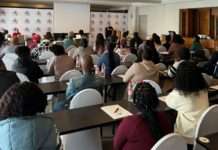This doesn’t make easy reading, nor was it easy to tell. But it’s a story we believe needs to be told because although our lives have been torn apart, ours is not a unique situation. To have someone murdered in South Africa for something as trivial as a mobile phone, happens on a daily basis and, inconceivably, is considered to be a ‘normal’ occurrence.
As a family, we lived in South Africa for 35 wonderful years – I will always be glad I had the experience of growing up in London and then spending more than half my life in Africa. But it wasn’t all wonderful. We came to regard burglary and crime in general as something inevitable, considering it with some cynicism, that we were, in effect, doing our part for the ‘Re-distribution of Wealth Programme’. We always felt relieved to find our car still where we left it, even more so when it hadn’t lost a wheel or had a window smashed. Arriving home to find that your house hadn’t been broken into and your belongings, even your underwear drawers, rifled through, always brought a sense of relief.
During the last few years it became more and more traumatic. We lived in a rural area only a short distance from Johannesburg and would often hear gunfire at night, or be woken to helicopters searching the area – usually unsuccessfully. Worse still, a number of our neighbours were murdered while we were there and more have been murdered since we left.
It is shocking to think that every year, thousands of people are murdered in South Africa: 17,068 in 2013/14 (1), an increase of 809 on the previous year. The majority of these murders occur in low-income areas and are not associated with pre-meditated acts or robbery but rather as a consequence of assaults (2).
In a nation where murder is such a regular occurrence, it is unsurprising that most of these never hit the news, because it is ‘just another murder’. Regardless of race or nationality, every family and community in South Africa affected by losing someone this way, faces irrevocable, devastating grief, but most of these go unreported. The only ones that really hit the news are those that either effect high-profile individuals or overseas tourists with sole nationality of another country.
In February 2014, during a robbery, Jeremy Brooke, my son, known affectionately as Gumby, a dual citizen of South Africa and the UK, was murdered. At the time of his death he was in fact, a tourist in the country, on a dive trip to the (aptly named) Wild Coast, with a multi-national group of tourists and friends.
It was not long after they had all gone to bed for the night, when five men broke into the house and held the group at gunpoint demanding phones and keys to the vehicle they were using. Gumby being the way he was, stood up to these people in an attempt to protect his friends and was deliberately held and shot.
He was hit in the face and chest and in the ensuing chaos and terror, lived long enough for the group to call for help, borrow a vehicle and try to get him to hospital, one and a half hours away. Gumby reassured them all that, while he didn’t want to die, he wasn’t scared of dying. His friends tried to hold his face together in an attempt to stop the air they were blowing into his mouth from escaping. He bled to death on the way to the hospital.
Tragically, life is so cheap in South Africa it seems that many perpetrators are never brought to justice and we understand that often, even when they are, the judicial process is not robust enough to end in conviction.
In Gumby’s case, because of the prompt action of the tour group leader, the police acted swiftly and impressively considering the remote area they were in at the time and within hours had arrested all five of the perpetrators. Since then, they have been positively identified, the evidence has all been gathered and remarkably, in a country where getting to trial can take up to three years, a trial date has been set for December this year. We can only pray that the outcome is ‘just’.
For those of us who loved Gumby we have lost a generous-hearted, free-spirit who loved nature and truly valued its gifts, sharing them with everyone he came into contact with and making them in turn a little more in touch with the amazing world around them. He made a remarkable impression on hundreds of people because he was a remarkable person and he will continue to inspire those whose lives he touched in ways that he probably could never have imagined.
BUT, he isn’t the only one. Every single life that is lost in South Africa through murder, whether by accident or design, leaves a gaping hole in the lives of those who knew and loved them. How can this be allowed to carry on?
No one in South Africa is safe or immune from crime and the life lasting effect it has on the people left behind. EVERYONE, including all tourists, are at risk, between 15 and 20% in 2012/13 (3). We lived on the edge of one of the most important World Heritage Sites – the Cradle of Humankind. This area is 49,000 hectares of privately owned land, much of it game farms and private resorts. Now, I understand (three years after we returned to live in the UK) that all hotels and venues in the area have extensive CCTV coverage on their properties, in an attempt to reassure potential visitors of their safety.
Tourism was always under threat, and now, in a nation struggling to build its identity where tourism could potentially make a significant difference to the people of South Africa, every murder diminishes the opportunity for the population to benefit and thrive. Even nature is not immune as is evident with the decimation of the rhino population and the horrific threat of wildlife extinction. Faced with the facts, it would appear that the value of life in South Africa in general, is not very high.
Our family has to wait now and hope that we will see justice done. But while we wait, I’m writing this to ask people to stop for a moment and think about what is happening here. To ask yourselves, each-other, your communities and politicians – can it go on?
How many more families and friends will have to face the loss of somebody they cherish and love for the want of a mobile phone and a vehicle, worth maybe only a hundred pounds?
‘What will it take for this to stop?’
Source – The Gumby Legacy
The Gumby Legacy is intended to be a space for people to find hope amongst their sadness. It was created to honor the passions and interests of a brother and son who lived life to the fullest. Our aim is to remember, celebrate and raise funds for all of the things that Gumby held dear…
South Africa Today












